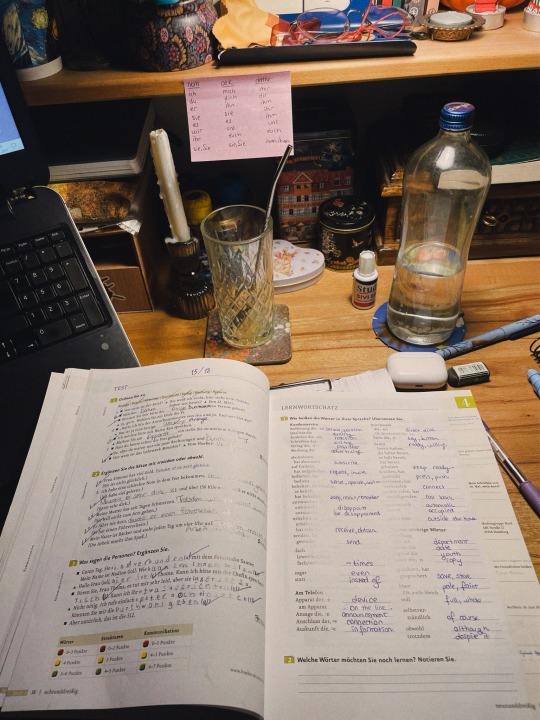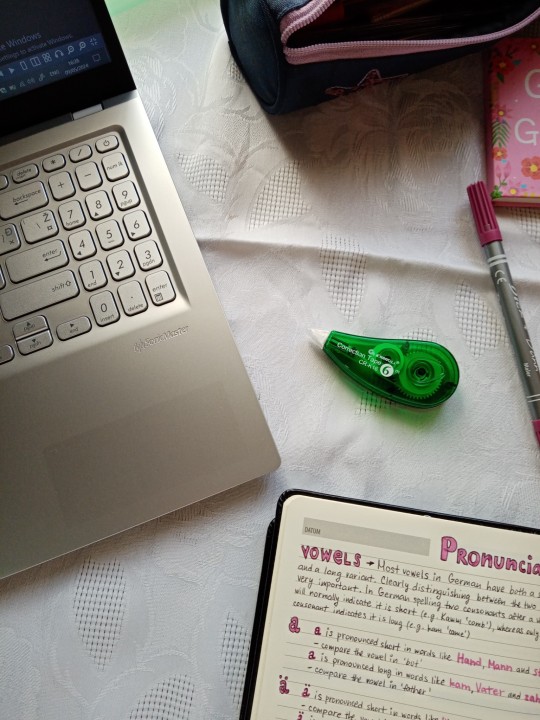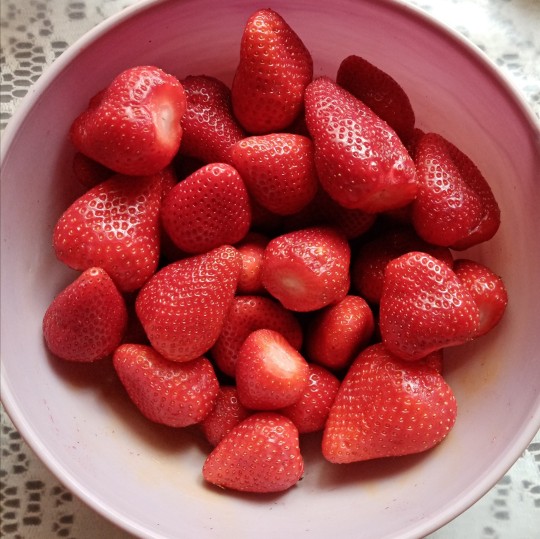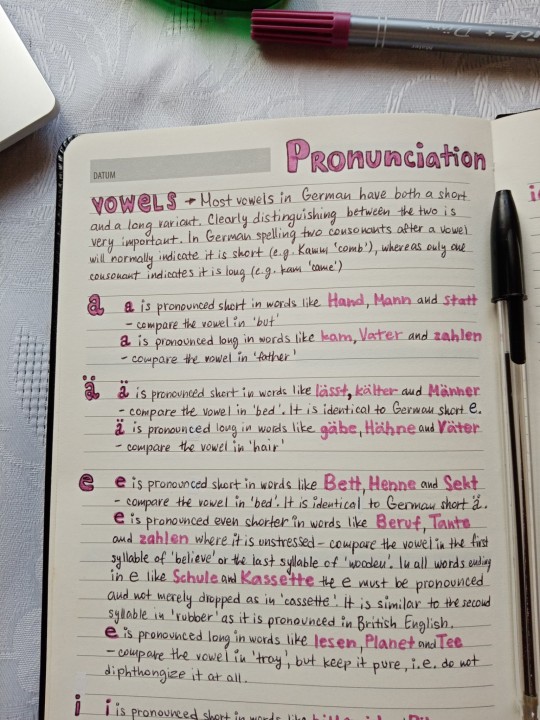#german langblr
Explore tagged Tumblr posts
Text








i’ll take my german a2 final exam on this tuesday, so… as you can see i’ve been studying german… a lot. my grades are good but i want to get a full mark in the final too :]
#studying#studyblr#studyspo#studystudystudy#study motivation#study blog#studygram#student#studyinspo#lunlunstudies#study hard#study space#study#study aesthetic#study inspiration#study notes#learning german#german learning#german langblr#langblr
940 notes
·
View notes
Text




New study corner!✨I am finally back. Life has been extremely harsh these past couple of months and now it's getting even more harsh because of all the documents I need to do, but at least I finally moved in with my fiancé. Since we are both living in Germany now, studying German is a must. Hope y'all are having a great day! 🫶🏻🩷✨
#langblr#german langblr#english langblr#dutch langblr#langblr community#language learning#studying languages#languages#german language#studyblr#study blog#language blog#studyspo#study inspo#study motivation#study motivator#study mood#study time#study aesthetic#study notes#study inspiration#study space#studyblr community#study study study#polish langblr#original content#🍙✨
274 notes
·
View notes
Text
*gripping bathroom sink* every foreign accent is a sign of bravery, every foreign accent is a sign of bravery-
681 notes
·
View notes
Note
dear germanenthusiast. just now i repeatedly spilled tea from an overflowing mug. in fact, i kept spilling the tea as i was wiping the spill, and i found myself stuck on how to say "this is so sad" in german - which saved my remaining tea, but left me with a question. "das ist so traurig" sounds not applicable to the situation (traurig feels like a person word, not a situation word, if that makes sense?). please advise. MFG <3
Dear muzaplacha,
i hope the tea was good despite everything.
"Das ist so traurig" truly doesn't feel quite right.
Traurig does in fact work with situations too, not only people; we actually do say "es ist so traurig, dass [situation] a lot but i feel like "das ist so traurig" just doesn't work as well as a standalone sentence.
I think the tricky part here is that "this is so sad" seems a deadpan (thus, in a way comedic) reaction and that is way harder to translate than ernest statements. (if you did not mean to imply any comedy, I'm sorry to have misjudged)
I can't come up with a sentence that, to me, carries both meaning (this is sad) and deadpan/comedy (which doesn't mean it's not possible, @linguistness, @official-lauchzwiebel maybe y'all have a fitting expression?).
If my tea kept spilling over, i might instead say one of the following:
- Schade. (10/10 German word)
- Na Großartig. / Na super. (obv. meant ironically)
- Mist. (10/10 German word)
but tbf i picture myself reacting with grunts of frustration more than words, which might explain my lack of a good translation for this specific situation
#love the very specific question!#hate my inability to give a good answer!#german#deutsch#langblr#learning german#german language#deutsch lernen#asks#german langblr
183 notes
·
View notes
Text
German Cooking and Baking Vocabulary
das Backblech -- baking tray die Backform -- baking tin das Backpapier -- baking paper der Esslöffel (pl. die Esslöffel) -- tablespoon das Küchenmesser (pl. die Küchenmesser) -- kitchen knife die Küchenwaage -- kitchen scales der Küchenwecker -- kitchen timer der Messbecher (pl. die Messbecher) -- measuring cup der Ofen -- oven das Papierbackförmchen -- patty pan; paper case die Pfanne -- pan der Pfannenwender -- spatula die Reibe -- grater das Rezept (pl. die Rezepte) -- recipe das Sägemesser -- serrated knife der Schneebesen (pl. die Schneebesen) -- whisk das Schneidbrett (pl. die Schneidbretter) -- cutting board der Schongarer -- slow cooker das Sieb -- sieve der Sparschäler -- peeler der Stabmixer -- stick blender der Teelöffel (pl. die Teelöffel) -- teaspoon der Topf (pl. die Töpfe) -- pot; saucepan der Topfhandschuh -- (pl. die Topfhandschuhe) -- oven mitt der Topflappen (pl. die Topflappen) -- potholder die Zutat -- ingredient
(etwas) ausrollen -- to roll (something) out braten -- to roast; to fry einfetten -- to grease entkernen -- to core garen -- to cook hacken -- to chop kochen -- to cook; to boil messen -- to measure pürieren -- puree raspeln -- to grate reiben -- to grate schneiden -- to slice umrühren -- to stir (etwas) verquirlen -- to whisk (something) vorheizen -- to preheat (etwas) wenden -- to turn (something) over; to flip (something) wiegen -- to weigh würzen -- to season zubereiten -- to prepare
cremig -- creamy frisch -- fresh klebrig -- sticky knusprig -- crispy körnig -- grainy schmackhaft -- tasty tiefgefroren -- frozen
sich eine Schürze umbinden -- to put on an apron lange Haare zusammenbinden -- to tie up long hair sich die Hände waschen -- to wash one's hands
265 notes
·
View notes
Text
Learning German & Staying alive
☄ https://german.net/ - free online resource with some tests, text, and planty more. Great for reading and reading comprehention;
☄ https://germanwithlaura.com - great course that explains grammar a bit more manageable;
☄ https://www.clozemaster.com - somewhat of a duolingo-copy, gamification at ift greatest. From 100 to 50 000 common words in context, can be used for free;
☄ https://wunderdeutsch.com/uk/grammatik-null-u/ - grammar, but in ukrainian. Helpful;
☄ https://golernen.com/ - more grammar, with ukrainian language avaliable;
☄ https://piracywhiskeypoetry.tumblr.com/post/136460408137/language-resources-masterpost - masterpost with multiple language;
☄ https://mein-deutschbuch.de/grammatik.html - another damn grammar
☄ https://www.quia.com/web - tests, some fun stuff.
sheesh I would need to make it pretty, but for now will do
1K notes
·
View notes
Text
what is the alternative version of 'live laugh love' in other languages? I have one for German:
Leben Lachen Zettel laminieren
68 notes
·
View notes
Text
RAH RAH RAH RAH PEOPLE WHO SPEAK/WANT TO LEARN GERMAN AND LIKE THE HOBBIT BOOK. LISTEN TO ME
ARD (THE GERMAN EQUIVALENT TO THE BBC) HAS AN AUDIO BOOK OF THE HOBBIT ONLINE. AND YOU CAN DOWNLOAD IT!
BUT ONLY UNTIL JANUARY 24TH, AFTER THAT THEY'RE TAKING IT DOWN
#langblr#German#German language#the hobbit#learning German#I'M PUTTING THE LINK IN A RE LOG#German langblr
260 notes
·
View notes
Text
i feel so bad for non-german speakers. they’ll never know the true impact of calling someone maus
63 notes
·
View notes
Text
12.06.2024


Turns out the presale for the concert doesn't start today but tomorrow exactly during my dermatologist appointment, so i'll have to figure that out. I had a slow morning, then got into studying. Read a chapter on electric circuits, solved some practice problems. Then reviewed my old chemistry notes. I also made and reviewed my german flashcards, and reviewed old notes. I had to reschedule my trip to germany for august :/ but at least maybe i'll be able to get my drivers license before leaving.
total time studied: 6 hrs 12 minutes
#immanuelcvnt#study blog#studyblr#diary#german langblr#journal#physics studyblr#stem student#studying
97 notes
·
View notes
Text
⋆。‧˚ʚ🍓ɞ˚‧。⋆
nia. 18. she.
hi! my name is nia and i’m a first year language student studying spanish and german in university! i hope to be a translator one day.
i’ve wanted to create a langblr for a long time and am very grateful i now have the opportunity to do so! i’ve been a casual observer in the community and have found a lot of good resources here and i think a langblr would be a great way for me to motivate myself. please reach out to me if you’d like to chat about anything! i interact from @sparks4000 -`♡´-
୧ ‧₊˚ 🍮 ⋅ ☆
──★ ˙ ̟ languages !
❀ english: my first language!
❀ irish: i went to a búnscoil lán-gaeilge (irish immersion primary school) and have good conversational irish! i would like to improve my grammar and written but it is not my priority right now
❀ spanish: i began studying spanish in secondary school but only started taking it seriously a year or two ago. now i study it at college level and will be taking a semester abroad in a spanish speaking country! i plan on becoming fluent in the language as soon as possible
❀ german: i only began studying german this year at university but i do plan on carrying through with it and reaching c2 level by the end of university!
❀ norwegian: i am very grateful to norwegian as it was the first language i ever truly began studying independently when i was around 11! i’ve studied it sporadically for many years now and do hope to one day reach c2 level, but it is not a priority right now. mostly i just listen to norwegian rock music (which i loveee) and occasionally watch movies or dubbed cartoons
❀ japanese: japanese is by far my newest and most underdeveloped language. at this time i have no plans to reach fluency in japanese. i began studying it because i collect tamagotchis and want to be able to understand the majority of the language used in the exclusively japanese toys! maybe in like 5 years i will take it more seriously, but for now i prioritise vocab and reading
#langblr#language tumblr#japanese#english#languge learning#norwegian#spanish#german#spanish langblr#irish#irish langblr#german langblr#japanese langblr#language learning routine#languages#learning languages#studying languages#language
28 notes
·
View notes
Text









if love and hate are the same words i love you german, if love and hate are the same words i hate you german<3
#seoul by rm<3#studying#studyblr#studyspo#studystudystudy#study motivation#study blog#studygram#student#studyinspo#german language#german langblr#german learning#learn german#learning#study aesthetic#study inspiration#langblr#lunlunstudies
441 notes
·
View notes
Text




❀ 𝟡𝕥𝕙 𝕞𝕒𝕪 𝟚𝟘𝟚𝟜 ❀
Some pics of my notes from today, the other two photos were made a while ago. I barely did anything today, hopefully tomorrow will be a more productive day. Wishing y'all a blessed evening! 🫶🏻✨
#langblr#german langblr#english langblr#dutch langblr#langblr community#language learning#studying languages#language#new langblr#studyblr#study blog#language blog#studyspo#study inspo#study notes#study motivation#study motivator#study aesthetic#study space#study inspiration#studyblr community#study study study#studying#original content#🍙✨
465 notes
·
View notes
Text
learning German vocab: 😁🌸☀☺️👍
learning German verb conjugation: 🌈🥰♥🌷😆
learning German gendered nouns and noun cases: 😵💫☹️😡😭⚡
learning about fucking du, ihr and sie (especially sie/Sie): 😑😮💨💣🗡😵
30 notes
·
View notes
Text
Scary scary German syntax... right?
The following sentence exhibits a typical mistake German-learners make: Heute ich gehe in ein Museum.
It's not conjugation ("ich gehe" is correct!), it's not declension ("ein Museum" is correct too!). The issue is "heute ich gehe". Correct would be: Heute gehe ich in ein Museum (or: Ich gehe heute in ein Museum.)
What's the rule here?
It's unfortunately not simply "there can only be one word before the verb"
German word order is so difficult be cause it is so variable. All following sentences are correct and synoymous (though emphasis shifts):
Der Opa schenkt seiner Enkelin zum Geburtstag ein Buch über Autos.
Seiner Enkelin schenkt der Opa zum Geburtstag ein Buch über Autos.
Ein Buch über Autos schenkt der Opa seiner Enkelin zum Geburtstag.
Zum Geburtstag schenkt der Opa seiner Enkelin ein Buch über Autos. All mean: The grandfather gifts his niece a book about cars for her birthday.
What do they all have in common, syntax-wise? There's only one phrase in front of the finite verb. What does this mean? A phrase is a completed (!) unit that can consist of one or more words (depending on the word class (-> noun, verb, …)) Typical word classes that can be a phrase with just one word are:
Proper nouns, plural nouns, personal pronouns, relative pronous (Lukas kocht. Busse fahren. Ich schreibe. Der Mann, der kocht, …)
Adverbs (Heute, Morgen, Bald, Dort, Darum, …) Most other word classes need additional words to form a full phrase:
adjectives need a noun and article: der blaue Ball, der freundliche Nachbar
nouns need a determiner (= article): der Mann, eine Frau, das Nachbarskind
prepositions need… stuff (often a noun phrase): auf der Mauer, in dem Glas, bei der Statue
…
A finite verb is the verb that has been changed (=conjugated) according to person, time, … All verbs that are NOT infinitive or participles are finite. ich sagte -> "sagte" is the finite verb ich bin gegangen -> "bin" is the finite verb The infinitive and the participle are called "infinite verbs" and are always pushed towards the end (but not always the very end!) of the sentence: Ich bin schon früher nach Hause gegangen als meine Freunde.
So: Before the verb (that is not the participle or infinitive) there can only be one phrase.
Since "heute" is an adverb (-> forms a full phrase on its own) and "ich" is a personal pronoun (-> forms a full phrase on its own), they can't both be in front of the verb "gehe" You have to push one of them behind the verb: Heute gehe ich in ein Museum Ich gehe heute in ein Museum.
Both of these are main clauses (Ger.: Hauptsätze), which in German exhibit "V-2 Stellung", meaning the finite verb is in the second position (after one phrase).
What happens if we push all phrases behind the finite verb?
Gehe ich heute in ein Museum? (Watch out: Gehe heute ich in ein Museum would be ungrammatical! The subject has to come in the second position)
It's a question now!
In German, question sentences (that do not start with a question word like "Was?", "Wo?", …) start with the finite verb (called "V-1 Stellung").
Questions, main clauses,… what's missing?
Dependent clauses!
The third type of sentence exhibits "V-letzt Stellung" or "V-End Stellung", meaning the finite verb is at the very end of the sentence. Ich bin gestern in ein Museum gegangen, … main clause -> V-2 Stellung … weil es dort eine interessante Ausstellung gab. dependent clause -> V-letzt Stellung If you want to practice this....
... determine if the following German sentences are correct. If not, what would be the right way to say it?
Der Zug war sehr voll.
Gestern ich war in der Schule.
Die Lehrerin mich nicht hat korrigiert.
Gehst du heute zur Arbeit?
Das Buch ich finde nicht sehr interessant.
To practice this further, translate the following sentences into German and focus on the order of words:
The boy gave the ball back to me.
I called my girlfriend because I missed her.
The girl saw her brother at the train station.
The horse, which was standing on the field, was white and black.
#it's definitely not easy#but you can totally learn it!#maybe you'll notice it from now on#don't worry if you still get it wrong though#that's completely normal#and you'll still be understood#being understood is the main goal of learning a language!#german#learning german#langblr#german langblr#deutsch lernen#deutsch#language learning#german language#german learning#language#german grammar
235 notes
·
View notes
Text
German Vocabulary: Herbs and Spices
der Anis -- anise; aniseed das Basilikum -- basil das Blatt (pl. die Blätter) -- leaf (pl. leaves) der Bund -- bunch der Cayennepfeffer -- cayenne die Chilischote -- chilli pepper das Currypulver -- curry powder der Dill -- dill die Fenchelsaat -- fennel seed die Flocken (pl.) -- flakes das Gewürz (pl. die Gewürze) -- seasoning; spice der Ingwer -- ginger das Kardamom -- cardamom der Kerbel -- chervil die Knoblauchzehe -- garlic clove der Koriander -- coriander; cilantro das Kraut (pl. die Kräuter) -- herb das Lorbeerblatt -- bay leaf der Meerrettich -- horseradish die Minze -- mint die Mischung -- mixture; blend die Muskatnuss -- nutmeg die Nelken (pl.) -- cloves der Oregano -- oregano das Paprikapulver -- ground paprika die Petersilie -- parsley der Pfeffer -- pepper der Piment -- allspice der Rosmarin -- rosemary der Safran -- saffron das Salz -- salt der Schnittlauch -- chives das Senfkorn (pl. die Senfkörner) -- mustard seed der Sternanis -- star anise der Stiel (pl. die Stiele) -- stem der Thymian -- thyme die Vanille -- vanilla der Zimt -- cinnamon
garnieren -- to garnish mahlen -- to grind reiben -- to grate salzen -- to salt würzen -- to season
aromatisch -- aromatic bitter -- bitter frisch -- fresh gemahlen -- ground getrocknet -- dried mild -- mild roh -- raw scharf -- hot; spicy süß -- sweet zart -- delicate
(die) geheime Zutat -- secret ingredient (die) Prise Salz -- pinch of salt der Salz-/Pfefferstreuer -- salt/pepper shaker nach Belieben -- to taste; as desired
76 notes
·
View notes